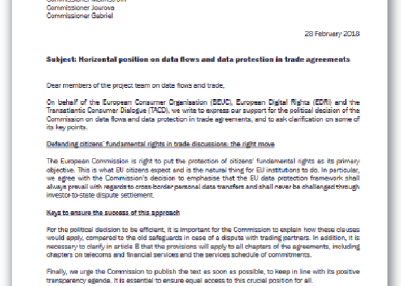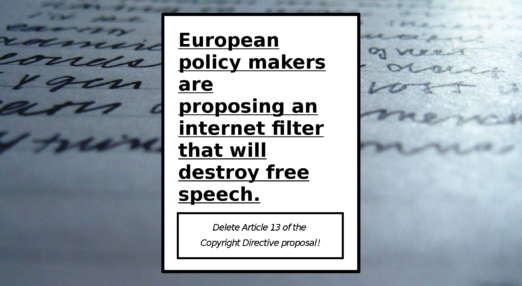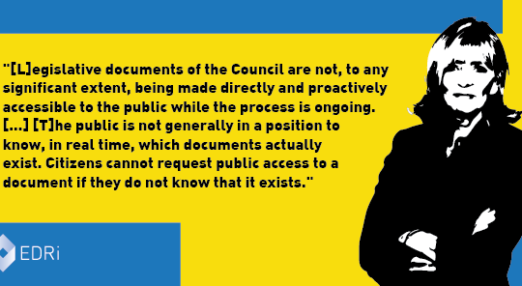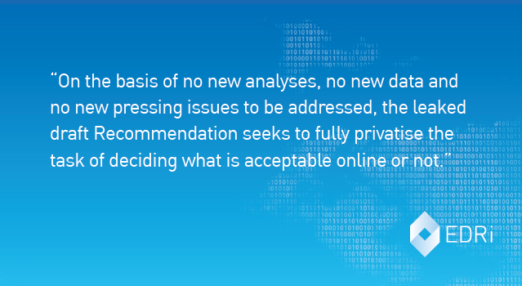Our work
EDRi is the biggest European network defending rights and freedoms online. We work to to challenge private and state actors who abuse their power to control or manipulate the public. We do so by advocating for robust and enforced laws, informing and mobilising people, promoting a healthy and accountable technology market, and building a movement of organisations and individuals committed to digital rights and freedoms in a connected world.
Filter resources
-

The European Commission rightly decides to defend citizens’ privacy in trade discussions
On 31 January 2018, the European Commission adopted horizontal clauses on data flows, data protection and privacy in trade deals. On 9 February, these provisions were leaked.
Read more
-

European internet filter will destroy your freedom of expression: Stop it now!
Policy-makers are working on the largest internet filter we’ve ever seen. An algorithm will decide which of your uploads will be seen by the rest of the world and which won’t. This is how the internet filter will rob you of your freedom of expression.
Read more
-

Final Copyright “compromise”: Upload filters for everyone but Google & Co
On 21 February, the rapporteur of the European Parliament’s Committee on Legal Affairs (JURI) Axel Voss issued his suggestion for a “compromise” on the Copyright reform, on which the Committee will vote in April.
Read more
-

In the making: The largest internet filter Europe has ever seen
European policy makers are working on the largest internet filter we’ve ever seen.
Read more
-

T-Mobile treats everyone equally unequally
The Dutch national regulatory authority, Authority for Consumers & Markets (ACM), has again decided that the mobile operator T-Mobile does in fact respect European net neutrality rules. EDRi-member Bits of Freedom believes the decision of ACM is short-sighted. On 8 February 2018, the regulatory authority published its decision on our objection to its decision on […]
Read more
-

European Ombudsman shares EDRi’s concerns on Council transparency
On 13 February 2018, the European Ombudsman Emily O’Reilly published a Recommendation regarding the transparency of the legislative work of the Council of the European Union. Her strategic inquiry, which involved the examination of the Council’s work around the legislative course of the General Data Protection Regulation (GDPR), among other files, showed that the Council’s […]
Read more
-

India set to have the world’s strongest net-neutrality protections
On 28 November 2017, India’s communications regulator, the Telecom Regulatory Authority of India (TRAI), recommended several net-neutrality protections be inserted into Internet Service Provider (ISP) licences.
Read more
-

Don’t make your community Facebook-dependent!
Facebook is to invest tens of millions in “community leaders” – on the condition that the community leader uses the “Facebook family of apps and services”. EDRi member Bits of Freedom argues for reducing the role of Facebook in your community.
Read more
-

Copyright reform: The Bulgarian Presidency strikes back
Article 13 is a key issue in the discussions on the “Proposal for a Directive on Copyright in the Digital Single Market” that have been going on since 2016. It proposes requiring services that store content on the internet for users to “take measures, such as content recognition technologies, aimed at preventing the upload of […]
Read more
-

General monitoring of communications to block “undesirable” content
Increasingly, demands are made that “something be done” about “undesirable” and “harmful” material on the internet: online child abuse images and other criminal pornography, “extremism”, “incitement to violence”, “hate speech”, – and more recently, “fake news”. Organisations representing holders of intellectual property (IP) rights similarly demand that measures be taken to prevent the sharing of […]
Read more
-

EDRi’s Press Review 2017
During the past year, our work to defend citizens’ rights and freedoms online has gained an impressive visibility – we counted more than two hundred mentions! – in European and international media. Below, you can find our press review 2017.
Read more
-

LEAK: European Commission’s reckless draft Recommendation on “illegal” content
In September 2017, the European Commission adopted its widely criticised “Communication on Illegal Online Content.” Now, already, due to political pressure and internal competition between various European Commission services, a new Commission proposal for a Recommendation on the same subject is close to being shared with the Council for unanimous support, albeit not being legally […]
Read more
